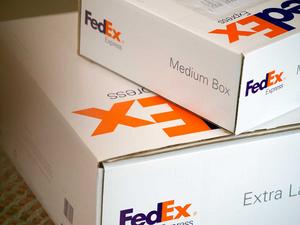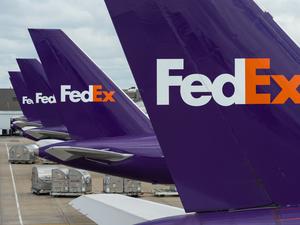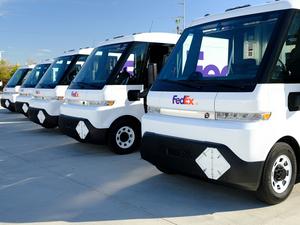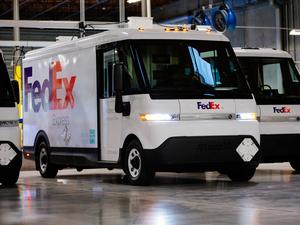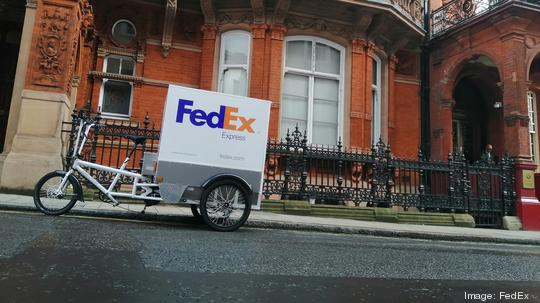
Do you remember paperboys, who rode around on bicycles and tossed newspapers into driveways?
Many millennials and members of Generation Z don't as the bicycles had already been swapped out for vans. But while the practice might seem outdated here, FedEx has drawn from it in another part of the world — and given it a modern feature.
Amid its efforts to reduce emissions and reach carbon neutrality by 2040, the delivery services giant now has 13 electric cargo bikes in Edinburgh, Glasgow, and Cambridge, where they’ll function alongside pickup and delivery vehicles, according to a press release. Already, FedEx has the bikes in London.
The new delivery method is just one example of the many moves FedEx is making across its international footprint, which, spanning over 200 countries and territories, can be hard to keep track of.
But here’s a sampling of actions FedEx is taking in vastly different parts of the world — and what it could say about the company’s plans going forward.
Electrifying in India
FedEx has set its sights on becoming carbon neutral, a $2 billion effort that’s expected to see the company shift from internal combustion engines to electric vehicles (EVs). By 2025, 50% of FedEx Express global PUD (pickup and delivery) vehicle purchases are expected to be electric, with that number rising to 100% by 2030.
This is going to take EV adoption throughout its footprint, and on Jan. 21, FedEx announced the start of an EV trial in India.
Expected to conclude in about a month in Bangalore, the trial will test the vehicle technology for subsidiary FedEx Express and assess its operational effectiveness on a standard route, while fully loaded with packages. If it shows positive results, the trial will be extended to New Delhi.
“With the growth of e-commerce in India, we’re constantly looking for ways to support this momentum while reducing environmental impact,” said Mohamad Sayegh, FedEx Express VP for India operations, in a press release. “The commencement of EV trials brings us one step closer to this vision.”
In recent months, FedEx has increasingly looked to expand its number of EVs. It was the first customer of BrightDrop, General Motors’ electric delivery and logistics business, and in early January, it signed an agreement with the company that reserves priority production for 2,000 electric delivery vans. This is in addition to the 500 it had already ordered, and FedEx is set to add up to 20,000 more in the coming years, pending further negotiations and execution of a definitive purchase agreement.
Exploring new possibilities for FedEx
In China, the company has now started using the DoraSorter – an AI-powered sorting robot — through a collaboration with Dorabot, a robotics solution provider that focuses on logistics. The bot is located at the company’s South China E-Commerce Shipment Sorting Center in Guangzhou, and the hope is that it will help mitigate the swiftly growing volumes of e-commerce-related shipments in the region.
The DoraSorter has a special drawer-shaped gripper that can connect with the conveyor built, and is equipped with a barcode reader that scans packages to obtain destination information. This way, it can use the gripper to receive a package from the belt, and move it to its corresponding destination slot.
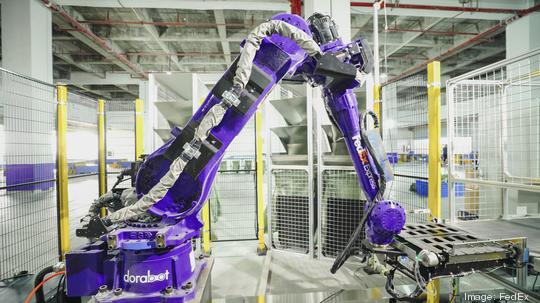
“With e-commerce taking center stage in the future of retail in our region, the speed with which a parcel can be picked up and delivered to customers’ doorsteps has become a dominant factor in driving the adoption of sorting robots,” said Kawal Preet, FedEx Express president of the Asia Pacific, Middle East and Africa (AMEA) region, in a press release. “AI-powered technology will continue to change how we support customers in the region and enhance supply chains for the future.”
The move comes amid the meteoric rise of e-commerce, which has companies increasingly turning towards at least some warehouse automation. According to a study from McKinsey & Company, the management consulting firm, the global warehouse automation market is projected to reach $51 billion by 2030.
FedEx’s has also spoken about increased usage of robotics and automation previously.
During the Q & A portion of a Sept. 21 earnings call, an analyst asked if the labor market woes meant this was an ideal time to pivot more toward a wider adoption of robotics and automation. CFO Mike Lenz noted that of the company's $7.2 billion in planned CapEx spending this year, a fair amount was allocated toward enhancing efficiency of facilities — which was "exactly the point" the analyst was hitting on, he said.
